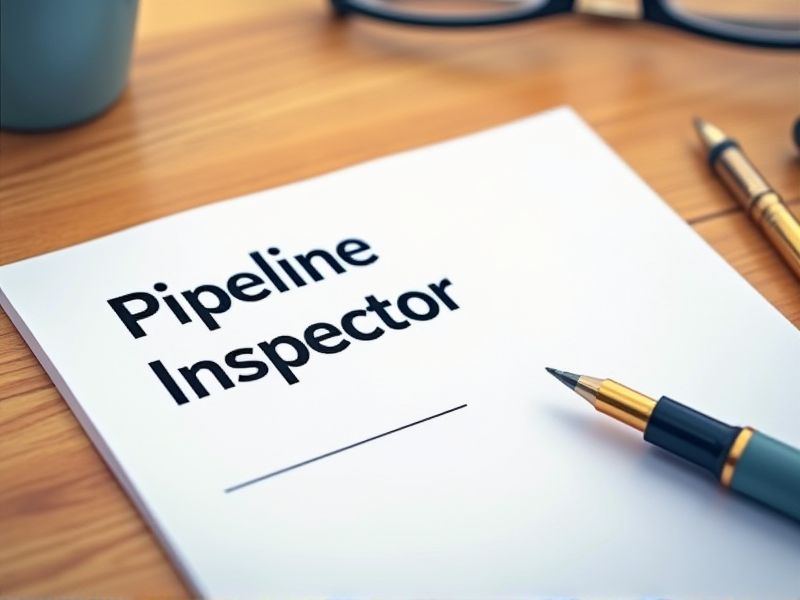
Pipeline inspectors play a vital role in ensuring the safety and integrity of pipeline systems. To perform their duties effectively, inspectors require specific certifications that demonstrate their expertise in industry standards and safety regulations. Certifications enhance an inspector's credibility and equip them with the knowledge to identify and mitigate potential risks. Here are essential certifications you may need as a Pipeline Inspector.
API 1169 Pipeline Construction Inspector Certification
The API 1169 Pipeline Construction Inspector Certification equips inspectors with specialized knowledge of industry standards, enhancing their ability to assess construction activities effectively. This certification ensures inspectors are up-to-date with the latest safety regulations, minimizing risks associated with pipeline failures. It also establishes a recognized benchmark of competency, giving companies confidence in hiring qualified professionals. As pipeline projects expand globally, certified inspectors become crucial for maintaining consistency and quality across various regions.
API 653 Aboveground Storage Tank Inspector Certification
The API 653 Aboveground Storage Tank Inspector Certification ensures pipeline inspectors understand the specifics of tank maintenance and repair, which directly affects operational safety and environmental protection. Certification assures employers and clients that inspectors possess the required knowledge to assess structural integrity and compliance with industry standards. Proper tank inspection reduces the likelihood of leaks, spills, and costly emergency repairs, which safeguards operational continuity. API 653-certified inspectors contribute to extending the lifespan of storage tanks, directly leading to economic savings for companies and enhancing safety.
NACE Coating Inspector Certification
The NACE Coating Inspector Certification is essential for pipeline inspectors to ensure they possess a comprehensive understanding of corrosion prevention, which helps in maintaining pipeline integrity over time. Corrosion can lead to significant economic and environmental damage if pipelines fail, so having certified inspectors ensures these risks are minimized. Certified inspectors are equipped to detect and assess coating defects accurately, thereby providing crucial evaluations that contribute to extending the pipeline's lifespan. Regulatory standards often require certified inspections to comply with safety and environmental protection guidelines, making certification a critical component of pipeline management.
ASNT Level II/III Non-Destructive Testing Certification
ASNT Level II/III Non-Destructive Testing Certification is crucial for pipeline inspectors as it ensures comprehensive knowledge and skills in evaluating the integrity of pipelines without causing damage. This certification verifies the inspector's ability to identify potential defects or issues within pipelines, which directly impacts safety, efficiency, and regulatory compliance. With evolving industry standards, certified inspectors can effectively apply the latest NDT techniques, minimizing the risk of leaks or failures. The certification also boosts credibility and trust among stakeholders, assuring them of the inspector's proficiency and commitment to quality control.
OSHA HAZWOPER Certification
OSHA HAZWOPER Certification equips pipeline inspectors with essential knowledge to safely manage hazardous material exposure during inspections. This certification reduces the risk of accidents by ensuring inspectors understand emergency response procedures in hazardous environments. Pipeline inspectors with HAZWOPER certification can effectively identify and assess potential dangers, leading to safer operational practices. Being certified enhances compliance with federal safety regulations, mitigating legal and financial liabilities for employers.
Confined Space Entry and Rescue Certification
Pipeline inspectors work in environments that often include confined spaces, which carry inherent risks like limited oxygen and potential exposure to harmful gases. Confined Space Entry and Rescue Certification provides them with the skills to identify these hazards and safely navigate these areas. This certification also trains inspectors in rescue techniques, crucial for responding effectively to emergencies. By obtaining this certification, inspectors ensure compliance with industry safety standards, reducing liability and enhancing workplace safety.
DOT Pipeline Safety Compliance Certification
Pipeline Safety Compliance Certification is needed for pipeline inspectors to ensure they understand safety regulations mandated by the Department of Transportation. It enhances the inspector's ability to identify and mitigate risks associated with pipeline operations. Certification equips inspectors with the expertise to uphold industry standards, which minimizes the likelihood of pipeline failures. It also plays a crucial role in ensuring public safety and environmental protection by promoting adherence to federal safety requirements.
Certified Welding Inspector (CWI) Certification
Certified Welding Inspector (CWI) certification ensures a pipeline inspector possesses the necessary technical knowledge to assess welding quality, critical for maintaining pipeline integrity. It establishes a standard of expertise, assuring employers and clients that inspections are conducted with a high level of competence. Welding flaws in pipeline systems can lead to catastrophic failures, so certified inspectors mitigate this risk by adhering to industry standards. CWI certification also enhances professional credibility, increasing career opportunities and trust among regulatory bodies.
First Aid/CPR/AED Certification
Pipeline inspectors often work in remote or hazardous environments where medical assistance might not be readily available, increasing the risk of injury. Having First Aid/CPR/AED certification enables inspectors to respond swiftly to emergencies, potentially saving lives in the process. The certification ensures compliance with occupational safety standards, which often require that personnel are equipped to handle medical incidents. Knowledge of emergency procedures can enhance team safety and operational efficiency, underscoring its importance in this field.
Environmental Compliance and Safety Certification
Environmental Compliance and Safety Certification is necessary for pipeline inspectors to ensure they adhere to regulatory standards that protect natural ecosystems. Proper certification reduces the risk of pipeline accidents, which often result in environmental contamination and significant cleanup costs. Certified inspectors can implement safety protocols effectively, minimizing hazards to both the workforce and local communities. This certification process builds public trust in the energy sector by demonstrating a commitment to sustainable and responsible operations.
Summary
When you obtain certifications as a Pipeline Inspector, your career prospects can significantly improve. These credentials often lead to increased job opportunities due to the high demand for qualified inspectors. Companies might offer you better compensation packages, recognizing your specialized skills and expertise. Consequently, certified inspectors often experience enhanced job security and professional growth.
